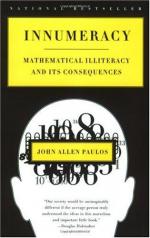
|
| Name: _________________________ | Period: ___________________ |
This test consists of 5 short answer questions, 10 short essay questions, and 1 (of 3) essay topics.
Short Answer Questions
1. What is often used to explain non-science?
2. What did the doctor invent?
3. According to Paulos, math has many ________.
4. Which of the following is mentioned as being highly affected by lack of estimating skills?
5. Things are often misused if they are ______.
Short Essay Questions
1. How does Paulos explain the famous monkey/Shakespeare probability example?
2. What is one of the largest errors in integrating math into a student's life? What is a common result?
3. What is Paulos' assertion regarding the principle of threes?
4. What are the most obvious causes of innumeracy?
5. How common is innumeracy? What is the opinion of the general population regarding the subject?
6. What is the discussion regarding the number of certainties involved in math?
7. What other fallacies were contributed by Freud?
8. How is it possible for people to ignore false outcomes in regards to probabilities?
9. Who is used as Paulos' example of educated innumerates? What is the person known for in the scientific world?
10. Why is the innumeracy in this case surprising to many?
Essay Topics
Write an essay for ONE of the following topics:
Essay Topic 1
Write a 1,000-word essay on how probabilities are used in your every day life. Include predictions as well as results for whatever event you choose. Create your own theories and test methods.
Essay Topic 2
Paulos talks about relating various mathematical functions and algorithms to every day life. Why? What is different about using math in the classroom as opposed to every day events? How could it benefit or hinder one's learning process? Give examples of the use of these functions in at least five scenarios.
Essay Topic 3
Freud and Jung are important people in Chapter 2. Compare and contrast the two famous doctors, their professional lives, careers, and legacies.
|
This section contains 600 words (approx. 2 pages at 300 words per page) |

|




